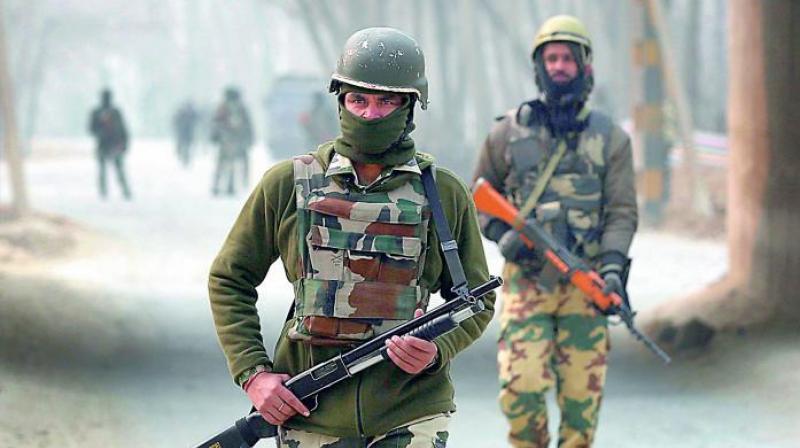J&K: No let-up in Pak proxy war

The Old Testament mentions that the philistine warrior giant Goliath was killed by David, the shepherd boy, with a stone thrown by a slingshot. Throughout the ages, popular sympathy, admiration and support have always been on the side of David. Similar is the case of the stone-pelting street mobs of pro-azadi supporters attacking Indian security forces in Srinagar and the Kashmir Valley. It is unlikely that they will be familiar with the David and Goliath story. But they are trying to create a similar parable about their confrontation with the security forces. The defence forces are attempting to disperse demonstrators organised inside the urban jungle of downtown Srinagar by jihadis of Lashkar-e-Tayyaba and Hizbul Mujahideen. In this contemporary replay of ancient biblical history, David will not win. This time around, the classic historical narrative will have to change.
The War of Algerian Independence (1954-1962) is little known in India except perhaps in some intellectual circles. This is certainly a pity since this forgotten “little war” fought in Algeria between French Army paratroopers and the insurgents of the “Front de Libération Nationale” (FLN) reiterated the David and Goliath theme. It had many lessons which retain a relevance to events currently unfolding in India, specially in areas like Kashmir, Chhattisgarh and Jharkhand, where socio-political temperatures have been bubbling above the danger level for quite some time now. Of these, the problems in Chhattisgarh and Jharkhand are purely of indigenous Indian design and manufacture. They have been created by sustained mistreatment of indigenous people by a cruel and heartlessly exploitative trader-politician nexus and sustained by an equally egregious hierarchy of eminently corruptible public officials. This was precisely the case in Algeria as well, and led to the Arab revolt against the French.
But Jammu and Kashmir is a different category altogether. The Kashmir problem has been created and developed entirely by Pakistan as part of its “revenge for Bangladesh” strategy. The Indian security establishment must never forget Pakistan’s politico-military payback strategy against India. Looking back on the long-forgotten war of Algerian independence, it is clear that one of the cardinal errors committed by France was in keeping the politico-military centre of gravity of that war in the European mainland, in metropolitan France. It should have shifted it to Algeria, centred on the regional capital city of Algiers, where the urban battlefield of the “Battle of Algiers” became the decisive theatre of operations.
The Algerian situation is mirrored, to a certain extent, in J&K, where control and domination of Srinagar is essential for control of geopolitical developments in the entire state. Similarly, firm control of Jammu and Leh are equally essential for control of the sub-regional centres of gravity in a geographically trisected state, though the internal politics of each sub-region follow their own paths. “Azadi” is a totally Valley-centric sentiment; Jammu and Leh is not a part of it. Stone-throwing is essentially a Valley-based activity, whose targets are Central police and paramilitary forces, which are seen by Srinagar mobs as “outsiders from India intruding into the Kashmiri heartland”. Here the main issue must be clear at all times — the mobs of stone-throwers rampaging on the streets of Srinagar, and attempting to interfere with the movement and operations of security forces, are separatists funded and supported by Pakistan. They have to be brought to heel.
It will be better if the process of political dialogue and friendly persuasion work with the agitators. If not, then harsher methods will have to be used. Connected with street agitators in Srinagar demanding azadi are others who are beginning to make an appearance on various college campuses in other parts of the country as well. Those who exercise their own right of free speech to counter and oppose such demands are dubbed “fascists” — the ultimate pejorative in students-speak. Terrorists and others wanted by the law cannot be allowed to escape under “crowd cover” provided by agitators. Attempts to do so will have to be prevented. Various student groups in India, particularly in Kashmir and other sensitive regions, have been prime targets for infiltration by hostile intelligence agencies, and their sponsored political groups. The aim is to create student unrest and disturbances on educational institutions.
This is a new form of “stealth attack” confronting India — a form of intellectual infiltration as dangerous in its own way as any physical infiltration across the Line of Control. And if some eggs are broken in the process of cooking, there should not be any regret, particularly if the eggs are bad. India is a democracy, often to a fault, where even the most outrageous and egregious freedoms are tolerated and accepted. But now the nation must be clearly told that this will no longer be tolerated. University students parading before television cameras daily in front of their institutions have to remove themselves and move to their places of work, normally lecture halls or laboratories. By its very nature, democracy is untidy and ill-disciplined. Unfortunately, it still remains the best method of governance available. It will have to suffice, until something better is devised. There does not seem any sign of that so far.

